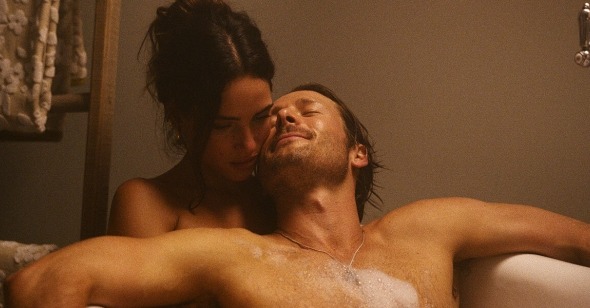In Character
By Shonni Enelow
Hit Man
Dir. Richard Linklater, U.S., Netflix
What a pleasure to watch a movie without a guilty conscience. What a relief to get to enjoy what everyone knows: movies create us, in our own fantasies and other peoples’, in our behaviors and expectations, in our public selves and erotic drives. Can we agree that in 2024 this doesn’t feel like the terrifying, dystopian development of “the society of the spectacle,” as the mid-century Marxists would have it––that it’s just kind of obvious? That it’s just the way identity and desire seem to work for us? If there weren’t movies, we would have to invent them. But we don’t have to invent them; here they are.
Hit Man is about a “Hit Man,” not an actual hit man—those don’t exist, we’re told, except in the movies—but our hero, Gary, in hit man drag. Gary (Glen Powell, who also co-wrote the script, based on a Texas Monthly article by Skip Hollandsworth) is a philosophy professor in glasses and jean shorts, shirt tucked in (natch), who lives alone in the suburbs with his two cats, Ego and Id, and eats dinner at a sad folding table. He also works part time for the police department, helping them run surveillance on their sting operations to catch people trying to pay for murder. When the cop who usually wears the wire gets suspended (for beating up some teenagers, in one of the film’s only nods to non-movie-violence), Gary goes in his place, after some vague instructions to be “all aggression” and yet “relaxed.” Turns out Gary is great at it, and soon he’s their number-one operative. The best part is that he tailors his various hit men to each would-be client, in costumes, makeup, and wigs that would make Philip Jennings (or RuPaul) proud.
The visual joke works over and over, in part because Powell is so crisp and committed, in part because his body is itself the best punchline: seeing this absurdly cut guy, who seems to have been generated by AI from the prompt “hunk (white),” in a dirty ponytail wig with brown smears on his teeth and neck tattoos, or with a red coif and coke-bottle glasses, talking in an Austin Powers accent, is a pleasure in and of itself. It may seem preposterous, but the whole point is that no professor looks like that. We’re watching a movie: drink up! When he shows up to meet Madison (Adria Arjona), the cowed young woman who wants to kill her abusive husband, as Ron––who looks just like Glen Powell, with an unbuttoned black shirt and a silver necklace––the meta joke comes home. Obviously, everyone wants to fuck Ron, as Gary himself hears when he listens over a hot mic to his colleagues at the police department. One of those colleagues, it must be mentioned, is Retta, whose timing is so perfect you could set a clock by her. The other is Sanjay Rao, also excellent, whose matter-of-fact disclosure that he would also fuck Ron, thank you very much, is maybe the best antihomophobic joke I’ve heard in a mainstream film.
And there is something a bit subversive going on here, under the wigs and movie-clichés (professor takes off his glasses and…). It’s not just because of the queer-adjacent theatricality in which Powell clearly delights. After Gary, as Ron, encourages Madison not to kill her husband (and not to incriminate herself), she texts him and they meet up, still in character as Ron, who in addition to being hot, loves puppies and children. Responding to Madison’s disbelief that he could be so perfect, he looks inquiringly at her: “I guess I’m…your fantasy?” We hear Gary’s voiceover throughout the film, guiding us through his story, but if that by definition puts us in his head, seeing things from his perspective, the film also slyly offers a different tack: Ron is a creation of Madison’s fantasy, basically constructed for her erotic satisfaction alone, and indeed, the film is far more interested in Powell’s body than in Arjona’s. She is hot, of course, but he’s the erotic object around which the film revolves.
Linklater’s erotics, iconically heterosexual though they are, always have a bit of something else in them––something connected to his films’ sense of play. In Everybody Wants Some!!, his 1980-set college sex farce from 2016, in which Powell also appears, the manic skirt-chasing of a college baseball team is book-ended by blatantly homoerotic interactions—when a new recruit first shows up, for instance, they size him up and slap his ass. Sex is all over that world, promiscuous in all senses of the word.
It helps that actors in Linklater movies are relaxed enough to actually be sexy; the charm is unforced, the bodies are loose, even when the characters themselves are uptight (Julie Delpy’s Céline in the Before trilogy, for instance). In Hit Man, Powell adds a dash of high-strung weirdness to Linklater’s easygoing scenes, the eagerness and slightly abashed bearing of a theater kid (in Everybody Wants Some!!, he revs up the jock-y group scenes of the baseball team with quizzical elan; he makes everyone else sound a bit dull or stoned). He shines in the fast-talking, back-and-forth with Arjona that concludes the film. In the end, in true romantic comedy fashion, the two of them wind up in harmony, fulfilling all appearances of the ideal Hollywood couple. But we know the delicious truth. Kudos to Linklater for giving us the amoral ending our queer, cinephilic gazes crave.
